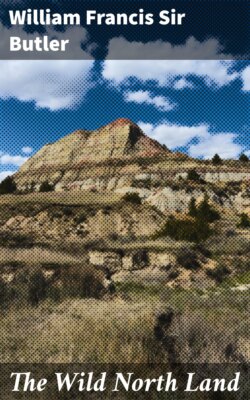Читать книгу The Wild North Land - William Francis Sir Butler - Страница 6
На сайте Литреса книга снята с продажи.
ОглавлениеTHE
WILD NORTH LAND.
Table of Contents
CHAPTER I.
Table of Contents
The Situation at Home.—The West again.—A Land of Silence.
There had never been so many armies in England. There was a new army, and there was an old army; there was an army of militia, an army of volunteers, and an army of reserve; there were armies on horse, on foot, and on paper. There was the army of the future—of which great things were predicted—and far away, lost in a haze of history (but still more substantial than all other armed realities, present or future), there lay the great dead army of the past.
It was a time when everybody had something to do with military matters, everybody on the social ladder, from the Prime Minister on the topmost round to the mob-mover on the lowest.
Committees controlled the army, Departments dressed it, Radicals railed at it, Liberals lectured upon it, Conservatives condemned it, Peers wrote pamphlets upon it, Dukes denounced it, Princes paraded it, and every member of Parliament who could put together half a dozen words with tolerable grammatical fluency had something to say about it.
Surely such a period must have been one in which every soldier would have recognized the grandeur and importance of his profession, and clung with renewed vigour to a life which seemed of moment to the whole British nation. But this glowing picture of the great “nation of shopkeepers,” suddenly fired by military ardour, had its reverse.
The stream of advancement slowly stagnating under influences devised to accelerate it, the soldier wearied by eternally learning from masters the lesson he could have taught, the camp made a place of garrison routine and not of military manœuvre, the uniform harness which had galled a Burton, a Palgrave, a Ruxton, and a Hayward, from ranks where the spirit of adventurous discovery sickened under chilling regulation—this harness made more unrelaxingly irksome; a system of promotion regulated by money—the offspring, it is true, of foul corruption, but which had become not a little purified by lapse of time; this system, supplanted by one of selection theoretically pure, but destined to fall into that lowest of all corruptions, the influence of political jobbery: all this formed the leading features in that order of things, old and new, which the spectacle of a neighbouring nation, struck suddenly to the ground by a mighty army, had caused the panic-stricken British people to overhaul and to reconstruct.
Taken any way one can, an army on paper is not a satisfactory profession. It is subject to sudden and unlooked-for bursts of military zeal; it is so bent upon nervously asserting itself fit for anything; it is from its nature so much akin to pen, ink, and envelope of a common-place type; it has such disagreeable methods of garrisoning the most pestilential spots upon the earth, and abandoning to republican bluster whole continents called colonies; those who shape its destinies are so ready to direct it against matchlock monarchs and speared soldiery; while arms are folded before those conflicts which change the past and future of the centuries; all these considerations go a great way towards making the profession of arms, on paper, at any time an anomaly.
But when there was also present to the memory of one who thus regarded the new order of military life, the great solitudes, the inland oceans, the desolate wilds, the gloomy forests of a far-away land, through which his former wanderings had carried him; when thought re-sought again those vast regions of the earth where Nature has graven her image in characters so colossal, that man seems to move slowly amidst an ocean frozen rigid by lapse of time, frozen into those things we name mountains, rivers, prairies, forests; man a mere speck, powerless so far to mark his presence, in blur of smoke, in noise of city, in clash of crank, or whirl of wheel: when these things came back in pictures touched by the soft colours Memory loves to limn with, there were not wanting dull professional outlooks and dearth of service to turn the footsteps gladly into the old regions again, there to trace new paths through the almost exhaustless waste which lies between the lonely prairies of the Saskatchewan and the icy oceans of the North.
What shall we call this land to those who follow us into its depths?
It has prairies, forests, mountains, barren wastes, and rivers; rivers whose single lengths roll through twice a thousand miles of shoreland; prairies over which a rider can steer for months without resting his gaze on aught save the dim verge of the ever-shifting horizon; mountains rent by rivers, ice-topped, glacier-seared, impassable; forests whose sombre pines darken a region half as large as Europe; sterile, treeless wilds whose 400,000 square miles lie spread in awful desolation. How shall it all be called?
In summer, a land of sound, a land echoing with the voices of birds, the ripple of running water, the mournful music of the waving pine-branch; in winter, a land of silence, a land hushed to its inmost depths by the weight of ice, the thick-falling snow, the intense rigour of a merciless cold—its great rivers glimmering in the moonlight, wrapped in their shrouds of ice; its still forests rising weird and spectral against the Aurora-lighted horizon; its notes of bird or brook hushed as if in death; its nights so still that the moving streamers across the northern skies seem to carry to the ear a sense of sound, so motionless around, above, below, lies all other visible nature.
If then we call this region the land of stillness, that name will convey more justly than any other the impress most strongly stamped upon the winter’s scene.
